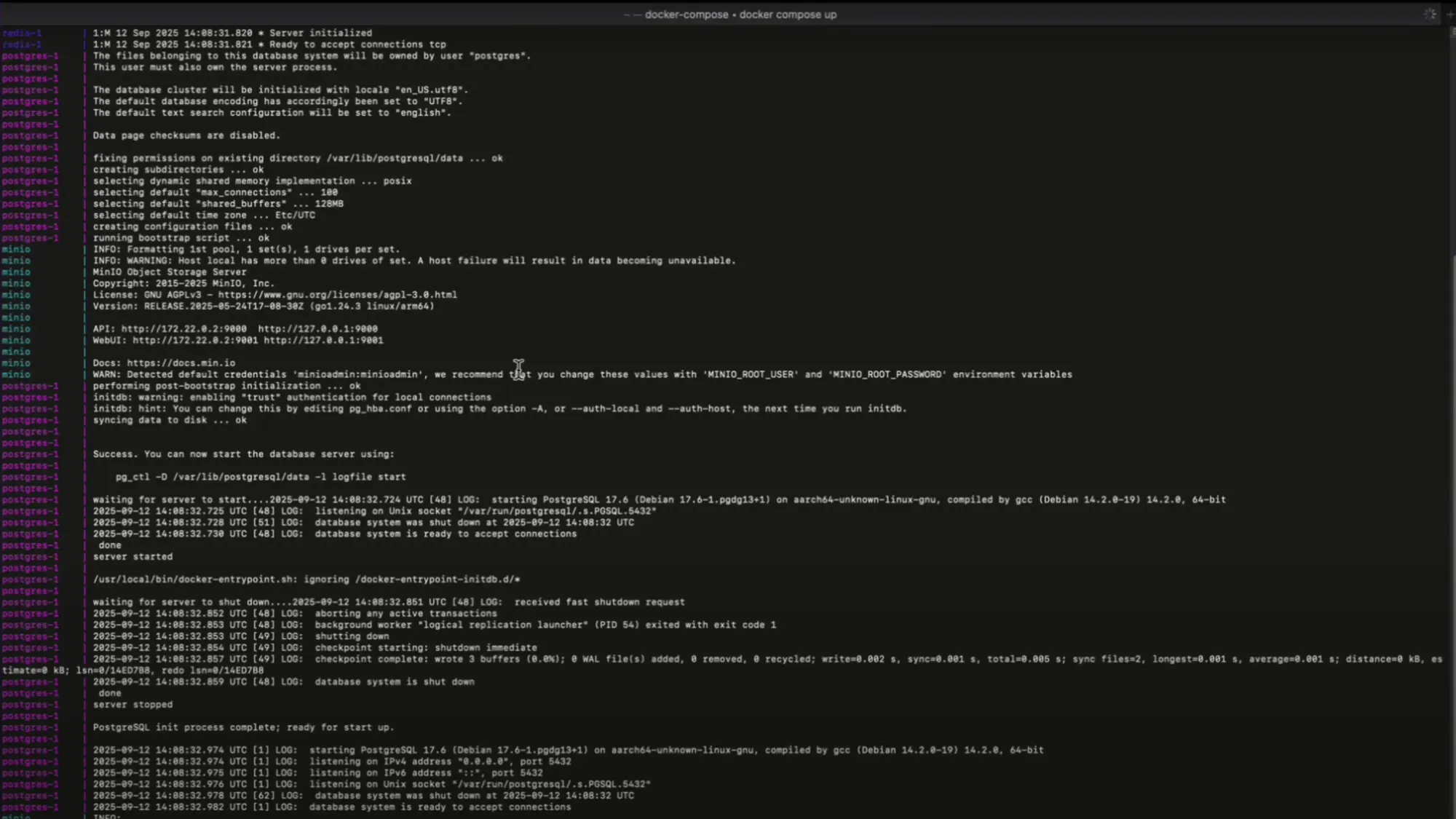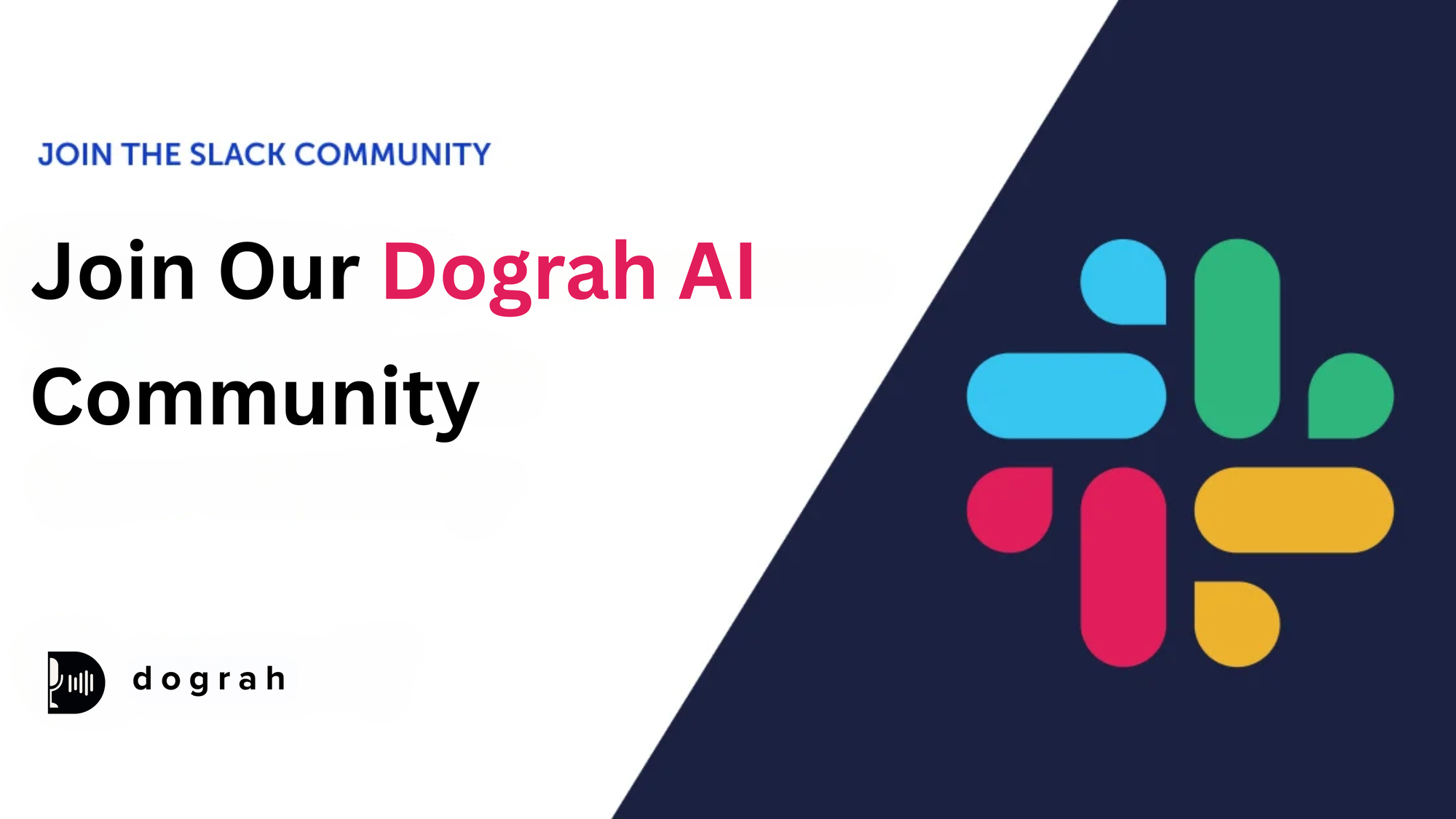AI Calling Implementation is rapidly becoming a game-changer for customer service, with 80% of businesses planning to adopt voice AI by 2026. “AI helped agents respond to customers more rapidly, which is a good thing. But when it’s too fast, customers kind of wonder, ‘is this still AI?” - Professor Zhang of Harvard Business School. As AI helps agents respond faster and more accurately, companies are seeing improved efficiency, enhanced customer experiences, and significant cost savings.
Dograh open-source conversational workflow builder makes AI Calling Implementation process seamless and efficient for your business.
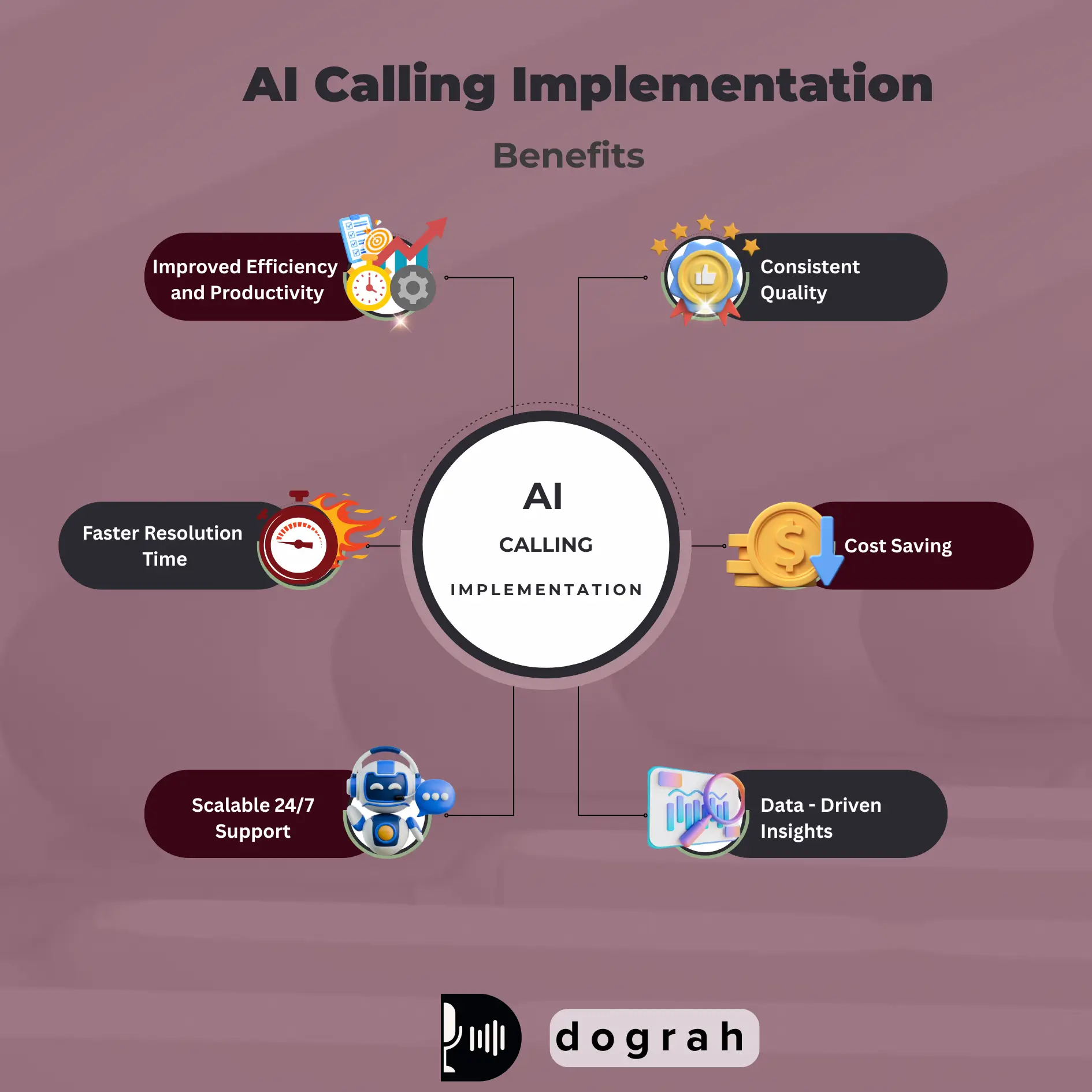
What all is needed for AI Calling Implementation
Implementing AI calling involves advanced technology, strategic integration, and smart conversational workflow design exactly what Dograh offers. “Dograh is an open-source platform and intuitive workflow builder that makes AI calling implementation efficient,” says Abhishek Kumar, Founder of Dograh.
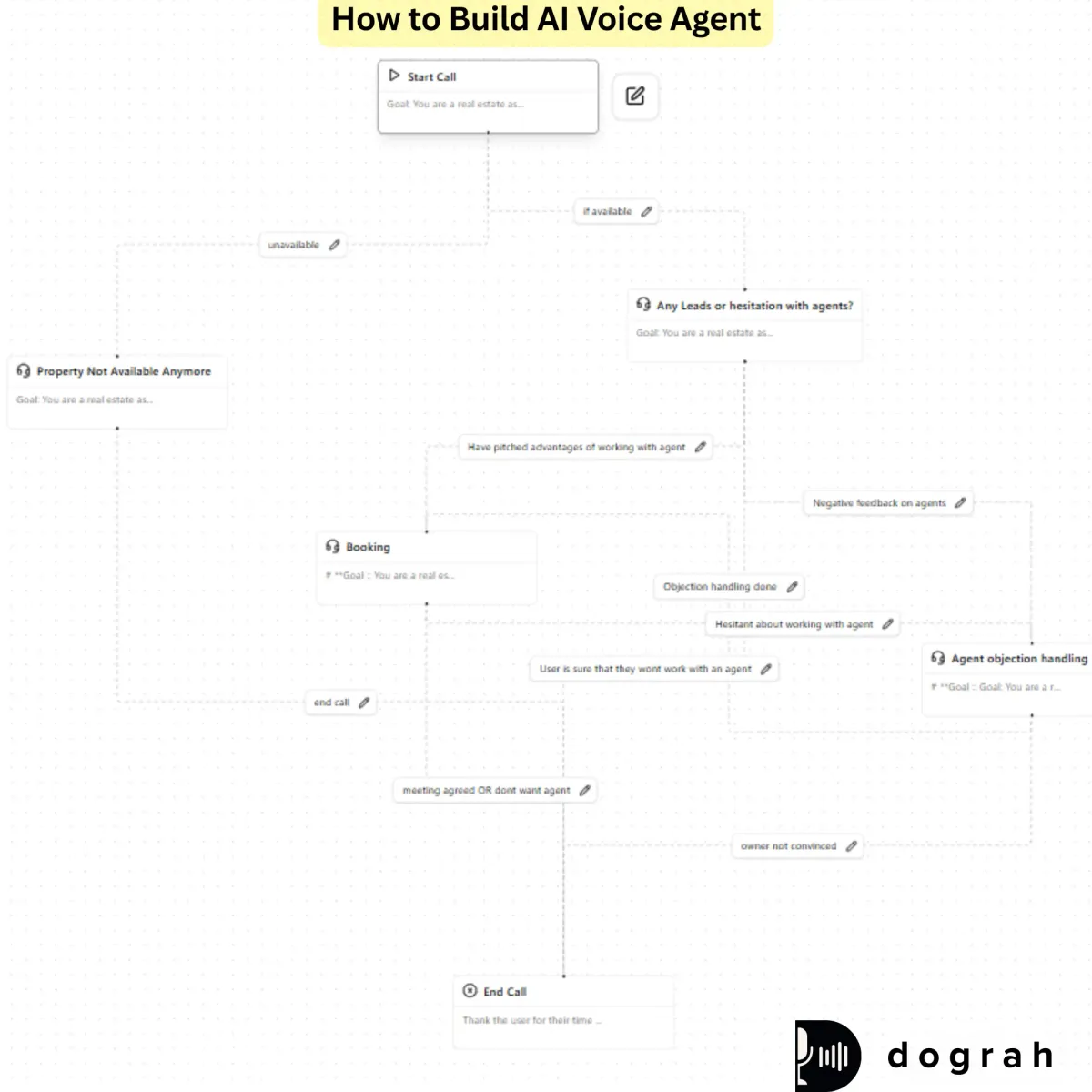
How to Build AI Voice Agent - Step by Step with Dograh

Automated Call Handling
To enable automated call handling, businesses must integrate AI voice agents with low latency (600–800 ms) to ensure natural-sounding conversations. Seamless CRM, calendar, and helpdesk integration allows the AI to log calls, update profiles, schedule appointments, and automate follow-ups. With 24/7 availability and cost savings, AI voice agents are projected to save over 100K hours of human phone time in 2025.
Technology to Enable AI Calling Bots
- Speech-to-Text (STT) : Speech-to-Text (STT) technology transforms spoken audio into written text, usually with a latency of 100 to 300+ milliseconds, measured from when the user finishes speaking to when the transcription is available. Latency varies based on the model and deployment, especially in cloud-based systems. Leading solutions like ElevenLabs Scribe v1 API deliver top-tier accuracy, while Deepgram offers high-performance real-time ASR with customizable models and multi-language support.
- LLM : Large Language Models (LLMs) enable voice agents to understand user intent, maintain context, and generate natural, human-like replies. After converting speech to text, the input is processed by models like LLaMA-3 (via vLLM), OpenAI, or Gemini. These models can also utilize features such as memory, tool integration, planning, or Retrieval-Augmented Generation (RAG) to access real-time data and deliver more intelligent, dynamic conversations.
- Text-to-Speech (TTS) Technologies : Text-to-Speech (TTS) transforms the AI’s text response into spoken audio, with latency typically measured between 75 to 300 milliseconds. is time to first byte the moment audio playback begins after receiving text. Modern TTS models like ElevenLabs Flash have significantly reduced this delay, achieving response times as low as 75–135ms, offering much faster and more natural interactions than earlier systems.
Personalization at Scale
Voice AI empowers businesses to analyze real-time customer data and tailor conversations instantly. With access to customer history, preferences, and past interactions, AI adjusts its script and recommendations on the go, making every conversation more personalized and engaging.
Comment
byu/Ok_Tumbleweed3983 from discussion
incallcentres

AI Calling Implementation Tutorial
An AI agent’s voice represents your brand, shaping trust and user connection. By customizing the tone, style, and speaking manner, you ensure every interaction feels natural, human, and aligned with your brand identity.
Dograh no-code platform makes designing and deploying custom voice agents simple with its intuitive drag-and-drop interface. While building a voice agent from scratch may seem complex, Dograh Workflow Builder streamlines the process, allowing anyone to create powerful, conversational AI agents without writing a single line of code.
Here’s a quick overview of Dograh’s Workflow Builder, which includes key components like Agent Nodes, Condition Nodes, and an API Configuration panel to customize your AI agent’s voice and accent. With drag-and-drop simplicity and flexible prompt settings, building voice agents is seamless. For a detailed step-by-step guide, check out "How to Build a Voice Agent"
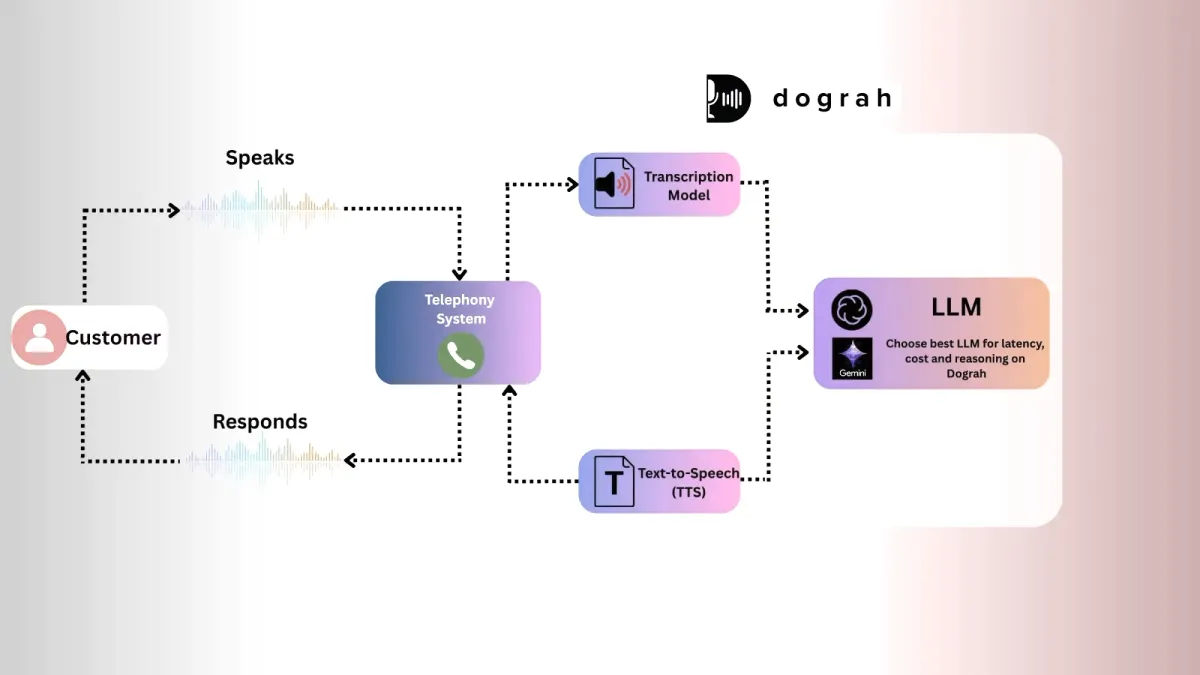
How to Build AI Voice Agent with No Code (Step by Step) ~ Dograh
Key Features of Advanced AI Calling Solutions
- Human Like Voice Technology : Leverages advanced models like Dograh and Eleven Labs Scribe v1 API to produce natural, human-like tones, making conversations more engaging and building user trust.
- Real time Analytics and Monitoring : Provides instant insights into call performance, customer sentiment, and response times, helping businesses enhance service quality and address issues proactively. This reddit comment summarises things correctly : “From automating calls to personalized voicemails, reviewing call recordings, stats, etc. there are so many features I use currently with AI,”
- Automate Scheduled and Escalation : AI helps to optimize call timing and automate outbound campaigns, boosting connection and conversion rates. In healthcare, where patient no-shows and missed appointments cost over $150 billion annually in the U.S. alone, AI-driven reminders can significantly reduce these losses.
- Data Security and Privacy Controls : AI voice agents are designed to comply with regulations like GDPR and HIPAA, ensuring the protection and privacy of sensitive customer data.
- 24/7 Availability : AI chatbots offer 24/7 access and provide a sense of privacy, as people may feel more comfortable sharing personal details with a computer rather than a human. Especially in the health care sector.
Why are businesses shifting to AI Phone Calls?
Businesses are turning to AI for Phone Calls helps in automating routine tasks like call routing and improve overall efficiency. According to Mullangi et al. (2018), the integration of AI into CRM services such as marketing, sales, contact centers, workflow, and HR has significantly enhanced resource allocation, saving both time and personnel across CRM processes.
AI Implementation in Business
AI implementation in business is quickly reshaping operations, decision-making, and customer engagement. According to a recent LangChain survey of over 1,300 companies, mid-sized businesses (100 - 2,000 employees) are leading the way - 63% already have AI agents in production. Surprisingly, non-tech companies are keeping pace with tech firms, with 89% to 90% respectively either using or planning to use AI agents. As this Reddit discussion puts it, “This isn’t just Silicon Valley hype anymore.”
Steps to Implement AI for Phone Calling
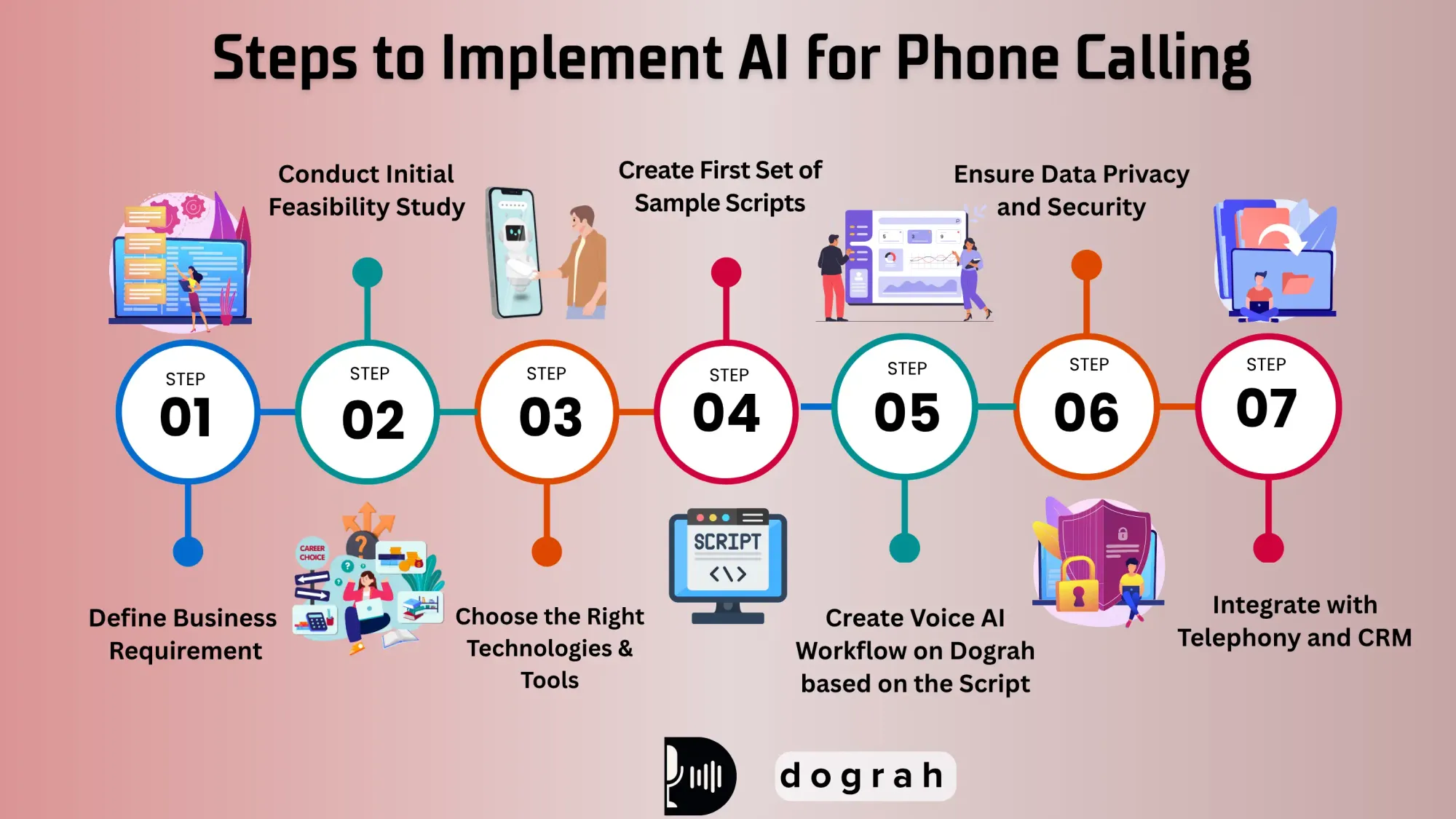
Here’s a guide that begins with identifying and defining your specific business requirements.
1. Define Business Requirements
The first step to successfully implementing an AI Voice Agent is to clearly define its objective and purpose. Based on your business goals and target audience, the AI system can be tailored to serve a variety of functions.
- AI Implementation Strategy for Customer Support : Enhance customer support for inbound calls by delivering instant responses, AI handles common queries, cuts down wait times, and boosts satisfaction. In fact, 56% of businesses use AI for customer service. “AI can significantly enhance sales and cold calling by automating lead qualification, analyzing customer behavior, and suggesting the best times to reach out,” says Freevia over reddit.
- AI Implementation in Healthcare : AI implementation in healthcare (41%) enhances patient care by enabling real-time diagnostics, personalized treatment, and 24/7 virtual assistance. It also streamlines administrative tasks like scheduling and record-keeping, improving overall system efficiency.
- AI Implementation in Banking / Finance : AI implementation in banking and financial services (38%) enhances fraud detection, risk assessment, and customer support through automation. It also streamlines processes like loan approvals and financial planning with greater accuracy and speed.
2. Conduct Initial Feasibility Study
After defining business requirements, the next key step is a feasibility study to assess if the AI project is viable.
- Integrating with Existing System : Evaluate if the AI solution can integrate smoothly with your existing systems like EHRs (Electronic Health Records) and clinical tools to ensure minimal disruption. Dograh’s workflow builder is designed for seamless integration, enabling faster adoption within current infrastructure.
- Data Requirements : Determine the types, sources, and quality of data required ensuring access to enough high-quality data, such as past call logs and customer details, for effective AI model performance and validation.
- Staffing and Expertise : Evaluate if your organization has the skilled personnel required to develop and implement the AI phone call system, including experts in AI, machine learning, data science, and software development. Also, consider whether training programs or hiring additional technical staff are necessary.
- Compliance with Regulations : Ensure your AI implementation complies with local, national, and international regulations on data privacy, security, and ethics, including laws like GDPR, CCPA, telemarketing rules, and industry-specific requirements.
3. Choose the Right Technologies and Tools
Voice AI agents are intelligent assistants that engage users in real-time, natural voice conversations by using key technologies like Automatic Speech Recognition (ASR), Speech-to-Text (STT), Large Language Models (LLMs), and Text-to-Speech (TTS). Dograh incorporates all these technologies seamlessly.
The other AI Calling Implementation Software are :
4. Create First Set of Sample Scripts
A well-crafted script is essential for delivering a natural, effective, and professional phone experience.
- Greetings
> Purpose: To welcome the caller, set a positive tone, and clarify the purpose of the call.
> Sample Scripts: “Hello! Thank you for calling [Company Name]. How can I assist you today?” - Handling Objections
> Purpose: To acknowledge concerns, provide reassurance, and keep the conversation moving forward.
> Sample Scripts: “I completely understand your concern. Let me see how I can help resolve this for you.” - Closing
> Purpose: To end the call politely, confirm next steps, and leave a positive impression.
> Sample Scripts: “Thank you for calling [Company Name]. If you have any more questions, feel free to reach out again. Have a great day!”
5. Create Voice AI Workflow on Dograh based on the Script
Dograh’s no-code platform simplifies the creation and deployment of custom voice agents through an intuitive drag-and-drop interface. While building a voice agent from scratch can feel overwhelming, Dograh Workflow Builder makes it easy enabling anyone to design smart, conversational AI agents with zero coding. For a complete step-by-step guide, check out "How to Build a Voice Agent with no Code."
6. Ensure data privacy and security
AI voice agents follow strict data protection laws such as GDPR and HIPAA. They ensure sensitive customer information is securely managed and privacy is maintained at every step.
7. Integrate with Telephony and CRM
Voice AI platforms integrate seamlessly with top telephony systems like Twilio, Genesys, RingCentral, 8×8, and Five9, enabling businesses to enhance their communication infrastructure. As this research paper quotes, "With the automation of several services of CRM, such as marketing, sales force, contact center management, workflow management, and human resources (HR) management, the implementation of AI in software has significantly improved operational efficiency."
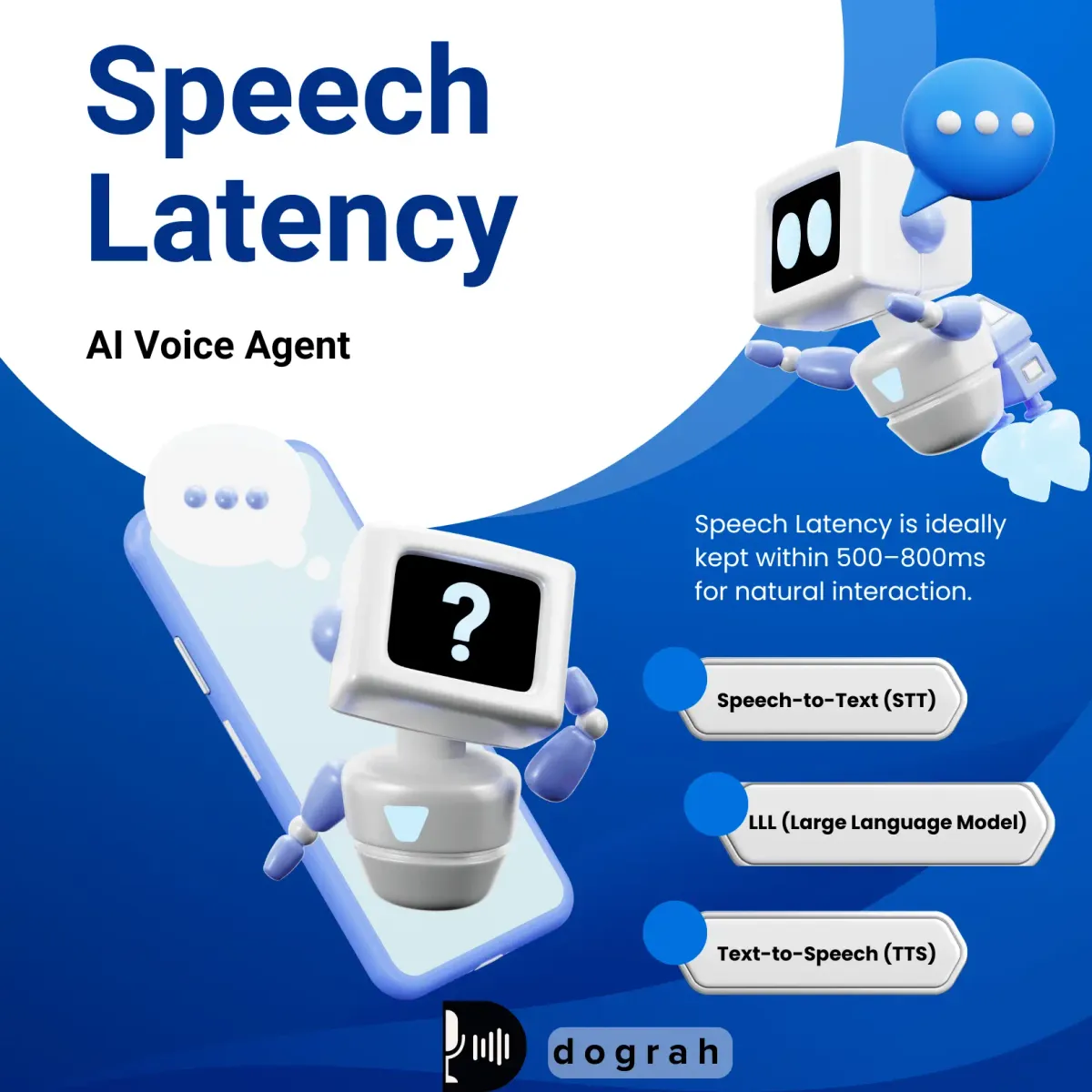
The Ultimate Guide to Reduce Speech Latency in AI Calling [Proven]

Conclusion
User studies in healthcare reveal positive experiences with AI chatbots, especially among adults over 60, who found them easy to use with low cognitive effort. An IBM study also showed a 30% boost in customer satisfaction after adopting Voice AI. These results underline how AI calling implementation can improve user interaction, efficiency, and satisfaction across sectors.
Getting started with Dograh
Interested in leveraging Dograh for lead generation, cold calling or business automation ? Here’s a streamlined path to getting started, along with direct links to essential resources :
1. Dograh AI: Quick Start Demo
2. Run Docker Command
Download and Start Dograh first startup may take 2-3 mins to download all images
3. Quick Start Instructions
How to Build AI Voice Agent - Step by Step with Dograh
Step by step written guide to building and deploying your first voice AI Agent
- Open Dashboard: Launch http://localhost:3000 on your browser.
- Choose Call Type: Select Inbound or Outbound calling.
- Name Your Bot: Use a short two-word name (e.g., Lead Qualification).
- Describe Use Case: In 5–10 words (e.g., Screen insurance form submissions for purchase intent).
- Launch: Your bot is ready! Open the bot and click Web Call to talk to it.
4. Community & Support
Join Slack Community and discuss issue with Dograh experts :
5. Additional Resource
Related Blog
- Discover the Top AI Communities to Join in 2025 for innovation and collaboration.
- Learn what makes Voice-Enabled AI Workflow Builders Effective in 2025.
- Discover how Making AI Outbound Calls Work: A Technical Guide for Call Centers can streamline automation and boost call efficiency.
- Explore AI Outbound Calling in 2025: What Actually Works Now to learn proven strategies for effective, real-world voice automation.
- See how 24/7 Virtual Receptionist Helps Small Firms Win More Clients by boosting responsiveness and improving customer engagement.
- Learn how How Call Automation Cuts Outbound Calling Costs by 60%: Virtual Assistant Guide can transform your call center’s efficiency and savings.
- Check out "The Ultimate Guide to Reduce Speech Latency in AI Calling [Proven]" for expert tips on making your voice agents faster and more responsive.
FAQ's
1. Is AI Calling Legal ?
Yes, AI calling is legal, but it must comply with data privacy and telemarketing laws such as GDPR, CCPA, and the Telephone Consumer Protection Act (TCPA). Businesses must ensure proper consent and transparency when using AI for voice communication.
2. How does AI Calling Agent work ?
An AI Calling Agent works by using NLP and Large Language Models (LLMs) to understand and generate responses, Speech-to-Text (STT) to convert spoken input into text, and Text-to-Speech (TTS) to deliver natural-sounding replies. This combination enables real-time, human-like voice conversations.
3. How to implement responsible AI?
Implement responsible AI by using Dograh’s no-code platform, which ensures transparency, data privacy, and compliance with ethical guidelines throughout AI voice agent development.
4. Can i use AI to make Phone Calls ?
Yes, you can use AI to make phone calls by leveraging platforms like Dograh and Deepgram, which seamlessly integrate with your CRM for smooth automation.
5. What is AI in BPO industry ?
AI in the BPO industry automates routine tasks, enhances customer interactions, and improves efficiency through intelligent voice agents and data processing.
Was this article helpful?




